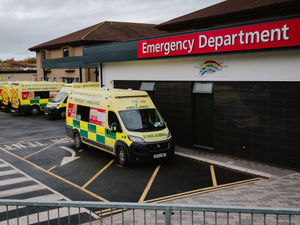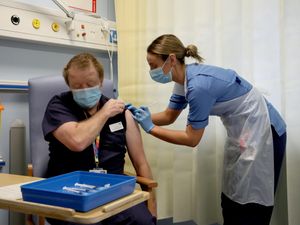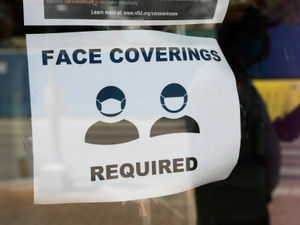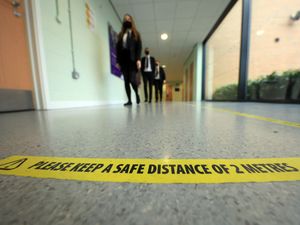Covid 'changed us' but also 'brought us together' says medic who survived intensive care ordeal
It almost cost him his life but a doctor has told how the pandemic "changed the way we do things, but it also brought us together".
Dr Hamza Ansari, a 42-year-old doctor working at Shrewsbury & Telford Hospital NHS Trust (SaTH), knows more than most about the impact of Covid.
Not only was he at the forefront of the NHS response to the pandemic but he also faced his own personal life-and-death battle with the virus.
Contracting Covid in the first wave of the outbreak in 2020 he required treatment in an Intensive Care Unit (ICU) where he was given 100 per cent oxygen over the course of nine days as his body fought the virus.
He survived, and incredibly was back at work, helping his colleagues and the public, within two weeks.
But the illness did leave him dealing with a number of short and long term effects.
Dr Ansari told how he would wake with nightmares for weeks in the aftermath of his ICU experience, grasping for the oxygen mask which was no longer there.
He has also spoken about how the virus worsened his asthma, leaving him taking extra medication and suffering more frequent attacks.
The world in November 2023 looks very different to the early weeks and months of the pandemic, when the fear about what was to come gradually played out with rising numbers of deaths across the country.
But as the Covid Inquiry has provided a stark reminder of the uncertainty that descended in 2020, Dr Ansari has spoken first-hand of how the tragedy of the pandemic remains an everyday reality for some.
He said: "I know some of my patients who had loved ones who unfortunately passed away from it. I was talking to one patient today and she broke down.
"I was talking to her about how her and her daughter nursed her husband through it but he unfortunately succumbed in the end. She said no-one deserves to die like that.
"My own cousin in India had to get a lung transplant because of Covid."
He added: "Two of my aunts in India also passed away because of Covid. There was no room in the ICU and no oxygen you could get at home.
"For myself I was thinking about it the other day. I remember when I went out of the hospital I felt so lucky I could walk out of hospital, but I kept having flashbacks. The first thing I thought was how close I was to dying.
"A patient who had Covid was telling me all these things just two weeks ago and I was thinking last night that we have gone through so much but we have not talked about it."
He added: "The patient I had today broke down crying saying the whole story about her husband and it was only last night that her and her daughter were discussing it and cried it out and got it all out.
"And she said for the patients, no one has gone to them and said 'what was it like for you during that period, what can we do for you guys'.
"The hospital looked after us but I know a lot of patients are having flashbacks over what they or their family members went through, and now they are catching up with them."
Dr Ansari said that his employer, SaTH, had been hugely supportive in the wake of his own ordeal – encouraging him not to return until he was well enough, and then offering a therapist to help deal with the mental scars of his battle.
He said: "I thank god every day that I am alive and now I am able to help people get through whatever they are facing."
He added: "The fact everyone kept on working, despite what happened to people like me, it is not because the NHS asked us to work, it is because we wanted to work because we want to be on the front line helping people – it is what I trained for."
Dr Ansari said he also believes that the strain of the pandemic, physically and mentally, is only now catching up with people.
He said: "We have just come out of a pandemic, everyone was on an adrenaline rush but in the last year I have noticed a lot of people coming to me saying how tired they are – physically and mentally, because we went through three years of having a huge part of the population wiped out and now we are trying to get back to normal routines and the adrenaline rush is wearing off so people are getting tired."





